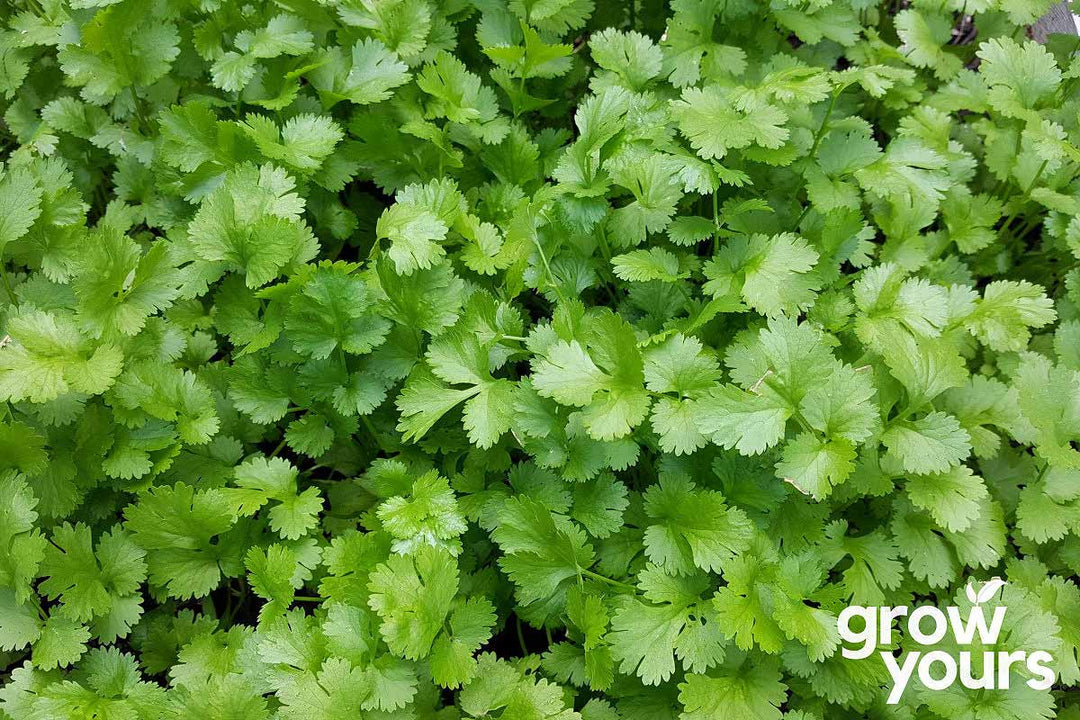
Coriander
- Fast shipping NZ wide
- In stock, ready to ship
- Inventory on the way
Botanical Name: Coriandrum sativum
Lifecycle: Annual



Coriander is a popular herb that produces feathery dark green leaves with a distinct taste.
It is very versatile and loved by many for its unique refreshing flavour. You can harvest its leaves as soon as they’re big enough to use, typically around a month after sowing by snipping above the base of the plant.
Coriander is one of the most widely used flavouring herbs in the world, and is a key ingredient in many cuisines. It can also be known as Cilantro or Chinese Parsley.
SOWING:
 |
 |
|
Spring – Early Autumn |
Sow Direct |
Coriander is best sown in spring through ‘til early autumn. Seeds perform best when sown directly in place approx. 5 – 10 cm apart, when soil temperatures are between 15°c – 25°c.
 |
 |
|
15°c – 25°c |
7 – 14 days |
It is suited for growing in pots or containers if garden space is limited, so long as it is watered regularly.
 |
 |
 |
|
5cm – 10cm |
40 – 60 days |
Half-Hardy |
TIPS:
Fresh coriander is typically added to dishes just before serving. Eat immediately upon picking for best flavour. Note that coriander leaves lose their aroma when dried or frozen, in contrast to several other popular herbs.
Please beware that it will not tolerate hot dry conditions, so ensure to keep your coriander plants sufficiently watered and mulched. If it’s soil dries out then coriander is inclined to bolt to seed. Mulching will help your garden to conserve water and encourage it to perform strongly.
APPROX SEEDS PER PACKET:
| HOME GARDEN ($3.50) | 500 seeds |
| BULK ($9.00) | 2,500 seeds |
We offer shipping New Zealand wide. We aim to ship all orders as quickly as possible once payment has been received.
We do our best to ensure that orders placed by 12pm on business days will typically be shipped same day, however during peak times this may not be possible.
Please note that large and/or heavy items like accessories and seed potatoes cost significantly more to ship than small seed packets, so our shipping rates are on a sliding scale accordingly.
SHIPPING RATES
All orders are subject to a shipping and handling charge, outlined as follows:
URBAN NZ WIDE
|
Urban Courier Delivery (0kg-0.75kg): |
$6.50 |
| Urban Courier Delivery (0.751kg-1.5kg): |
$8.90 |
| Urban Courier Delivery (1.51kg-3.0kg): | $10.90 |
| Urban Courier Delivery (3.01kg-5.0kg): | $12.90 |
| Urban Courier Delivery (5.01kg-7.0kg): | $14.90 |
| Urban Courier Delivery (7.01kg-10kg): | $16.90 |
RURAL NZ WIDE
| Rural via Standard Post (max. 150g, untracked): | $4.60 |
| Rural Courier Delivery (0kg-0.75kg): | $8.90 |
| Rural Courier Delivery (0.751kg-1.5kg): | $11.90 |
| Rural Courier Delivery (1.51kg-3.0kg): | $13.90 |
| Rural Courier Delivery (3.01kg-5.0kg): | $15.90 |
| Rural Courier Delivery (5.01kg-7.0kg): | $17.90 |
| Rural Courier Delivery (7.01kg-10.0kg): | $19.90 |
FREE SHIPPING OFFER
| Free Shipping NZ Wide: | Orders $75 and over |
We reserve the right to adjust any order where an incorrect shipping and handling charge has been applied, and to adjust our shipping rates as required.
ISSUES WITH SHIPMENT
In the unlikely event there is an error in your order we will correct this for you as soon as possible. Please ensure to check your order as soon as you receive it and inform us of any errors within 24 hours.
Our customers typically receive their orders within a few days of ordering, so if you have not received your order within 7 days please let us know immediately and we will follow this up for you. If your order has gone missing during transport we will make a claim with our shipping provider, which needs to be done within 14 days of dispatch.
To advise us of any errors with your shipment please email us on hello@growyours.nz
Botanical Name:
This is the formal scientific name for each plant, firstly identifying the genus and then the species to which it belongs.
The purpose of these Latin names is to have a single name that is accepted and used worldwide for a particular plant or plant group, and to help distinguish each plant uniquely from other plants.
Lifecycle:
This refers to the typical lifecycle of each plant.
Annual: Plants that complete their life cycle within 1 year (from germination to growing and producing seeds, then dying).
Biennial: Plants that complete their life cycle in 2 years (germinates and grows in the first year, then produces seeds and dies in the second year).
Perennial: Plants that have a life cycle of more than 2 years.
It is wise to consider the lifecycle of each plant before choosing its final growing position. For example, you may prefer to plant perennials away from annuals, so your perennials are not disturbed when your annuals are harvested at the end of their relatively short lifecycle.
Heritage:
This refers to the geographic region and approximate date of origin, as it is best known for each variety.
Please note that varieties listed as “pre 1900’s” are very old varieties that have often been grown for hundreds of years, and as such their specific dates of origin are hard to list accurately.
Best Sown:
This refers to when it is suggested the seeds are best sown, to encourage strong and vigorous growth in their ideal seasonal conditions.
Please note that while some varieties may be able to be sown outside the range suggested, they will generally perform best when sown in the approximate seasonal ranges provided.
Sowing Method:
This refers to the suggested method for sowing each variety. Using the appropriate sowing method will help to ensure you achieve best results.
Direct Sow: These are seeds that perform well when sown directly into your garden. These seeds normally produce fast growing and strong seedlings. Please note that young seedlings may still need some protection from harsh weather and pests.
Transplant: These are seeds that perform well when started in trays or containers and then transplanted to their final position once they’re a bit stronger. These seeds often produce slower growing and weaker seedlings that need some care and protection from weather and pests. Seedlings can typically be transplanted to their final position once they are large enough to handle (for example 5+cm tall with several true leaves).
Please note that for varieties where we list both methods you have the choice.
Soil Temp To Germinate:
This refers to the approximate soil temperature range for optimum germination of the seeds.
Please note that while some germination may occur outside these ranges, the seeds will typically germinate strongest when sown in the optimum soil temperature range provided.
Approx. Time To Germinate:
This refers to the approximate amount of time it takes for the seeds to germinate.
Please note that while some variation may occur, with ideal conditions this represents an average amount of time before germination. This relies in part on the seeds being sown in soil at an ideal temperature for germination, per the heading above.
Spacing For Seedlings:
This is the recommended spacing between plants in their final growing position.
Please note that spacing plants closer together than suggested will likely result in underperforming plants, due to crowding and over-competition for root space and available nutrients.
Approx. Time To Harvest:
This is the number of days until the plant typically reaches the purpose for which it is normally grown. For example, this is the time it takes for the plant to fruit or flower, or until the leaves are ready to be picked, etc.
Please note that while this refers to the beginning of harvesting time, the plants could keep growing for an extended period yet, particularly if kept well looked after.
Hardiness To Frosts:
This refers to how tolerant the plant is of frost and cold weather.
Tender: Plants that will be injured or killed by frost and cold weather. These plants will probably not survive winter.
Half-Hardy: Plants that will not tolerate severe frosts, but should otherwise survive winter.
Hardy: Plants that have the ability to survive frost and cold weather. These plants should survive winter.



